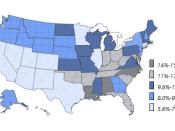Today there are many mental disorders in adults and children. All of these disorders are associated with cognitive, behavioral, emotional, and psychodynamic approaches. This paper will address schizophrenia, psychosis, and lifespan development.
Information on the biology of schizophrenia has increased dramatically in recent decades. Researchers have discovered brain function, brain structure, neuropsychological, and neurophysiological abnormalities associated with schizophrenia. The dopamine hypothesis-that excessive dopamine transmission causes psychosis-was the leading biological explanation of schizophrenic symptoms for many years. More recently, it has become clear that schizophrenia has a complex neurodevelopmental basis that includes abnormalities in several neurotransmitter and structural systems. At the predisposing level, several biological theories have been offered to explain the underlying causes of schizophrenia. Genetic evidence suggests that a predisposition to schizophrenia is inherited, but that genetic factors must interact with environmental factors for the disorder to develop. Possible biological environmental factors include viruses, toxins, drug use, and prenatal or postnatal injuries.
While Freud believed that biological factors played an important role in schizophrenia and was pessimistic about the value of psychotherapy, some of his followers developed psychodynamic explanations and treatments for the disorder. Most current psychodynamic theorists emphasize the role of biological and psychological factors in schizophrenia and see psychotherapy as a helpful adjunctive treatment. Cognitive theorists have focused on the role of attention and reasoning deficits in schizophrenia. Cognitive interventions address these deficits and are increasingly used in the treatment of schizophrenia often in combined cognitive-behavioral interventions. Behavioral theorists focus on the role of operant conditioning, along with other factors, in the development and maintenance of schizophrenic behaviors. Treatments based on behavioral principles, including token economies and social skills training, are widely used as adjunctive treatments for schizophrenia. Family theorists have explored the hypothesis that pathological family environments can contribute to schizophrenia. They focus on the role...


